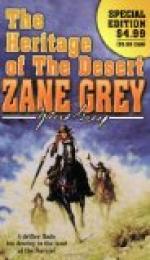“August, some of our young men need no one to corrupt them. Dene had no great task to win them. He rode in here with a few outlaws and now he has a strong band. We’ve got to face it. We haven’t any law, but he can be killed. Some one must kill him. Yet bad as Dene is, he doesn’t threaten our living as Holderness does. Dene steals a few cattle, kills a man here and there. Holderness reaches out and takes our springs. Because we’ve no law to stop him, he steals the blood of our life—water— water—God’s gift to the desert! Some one must kill Holderness, too!”
“Martin, this lust to kill is a fearful thing. Come in, you must pray with the Bishop.”
“No, it’s not prayer I need, Elder,” replied Cole, stubbornly. “I’m still a good Mormon. What I want is the stock I’ve lost, and my fields green again.”
August Naab had no answer for his friend. A very old man with snow-white hair and beard came out on the porch.
“Bishop, brother Martin is railing again,” said Naab, as Cole bared his head.
“Martin, my son, unbosom thyself,” rejoined the Bishop.
“Black doubt and no light,” said Cole, despondently. “I’m of the younger generation of Mormons, and faith is harder for me. I see signs you can’t see. I’ve had trials hard to bear. I was rich in cattle, sheep, and water. These Gentiles, this rancher Holderness and this outlaw Dene, have driven my cattle, killed my sheep, piped my water off my fields. I don’t like the present. We are no longer in the old days. Our young men are drifting away, and the few who return come with ideas opposed to Mormonism. Our girls and boys are growing up influenced by the Gentiles among us. They intermarry, and that’s a death-blow to our creed.”
“Martin, cast out this poison from your heart. Return to your faith. The millennium will come. Christ will reign on earth again. The ten tribes of Israel will be restored. The Book of Mormon is the Word of God. The creed will live. We may suffer here and die, but our spirits will go marching on; and the City of Zion will be builded over our graves.”
Cole held up his hands in a meekness that signified hope if not faith.
August Naab bent over Hare. “I would like to have the Bishop administer to you,” he said.
“What’s that?” asked Hare.
“A Mormon custom, ‘the laying on of hands.’ We know its efficacy in trouble and illness. A Bishop of the Mormon Church has the gift of tongues, of prophecy, of revelation, of healing. Let him administer to you. It entails no obligation. Accept it as a prayer.”
“I’m willing.” replied the young man.
Thereupon Naab spoke a few low words to some one through the open door. Voices ceased; soft footsteps sounded without; women crossed the threshold, followed by tall young men and rosy-checked girls and round-eyed children. A white-haired old woman came forward with solemn dignity. She carried a silver bowl which she held for the Bishop as he stood close by Hare’s couch. The Bishop put his hands into the bowl, anointing them with fragrant oil; then he placed them on the young man’s head, and offered up a brief prayer, beautiful in its simplicty and tremulous utterance.




